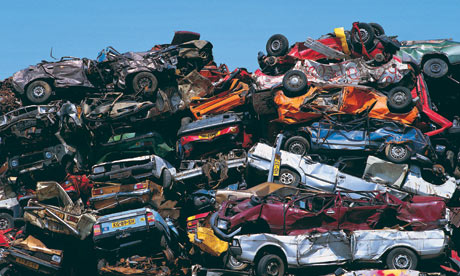
Human activity is wiping out 150 species of plants and animals a day. 17 million hectares of forest are destroyed each year. Top soil is being eroded 20-40 times faster than it is being replaced. 44% of commercially targeted marine fish stocks are over-exploited. These are the effects of monopoly capital’s hundred-year rampage across the globe. Twenty companies sell 94% of the world’s
agri-chemicals; five control 90% of the world grain market. Land in underdeveloped nations is purchased or placed under the control of these companies by the Structural Adjustment Programmes of the World Bank and the IMF, which, in recent years, have pressured over 70 countries into changing their mining laws in favour of multinational investment. These bodies force underdeveloped nations into producing cash crops and raw materials for export, using intensive methods that destroy the soil and drain resources.
Eleven Out of the top 100 multinationals (ranked by overseas assets) are British. Labour will never challenge their ascendancy – the middle class it represents would not tolerate it; the global cash-crop economy is increasingly tailored to particular luxury foods for Western consumption. In Britain, gangs of women and migrant workers work for a pittance, at the mercy of unscrupulous farm labour contractors. In underdeveloped nations, such as Kenya, which provided Britain with 75% of its fresh and chilled beans in 1995 and suffers infant mortality of 108 per 1,000 live births, or Zimbabwe, where a farmer is paid 1p for a 99p packet of mangetout, the vicious circle of poverty and environmental destruction is exacerbated by the operations of the multinationals. This too is an increasingly centralised business. The top ten British supermarkets, with 4,621 UK stores, between them ring up an annual turnover equal to the income of the poorest 35 third world countries. David Sainsbury (chair, Sainsbury’s) and Niall Fitzgerald (chair, Unilever) already have part-time jobs advising Tony Blair.
Environmental destruction will never be solved by an imperialist party. Labour’s target of a 20% reduction in CO2 emissions on 1990 levels by 2010 – largely achieved in the last seven years anyway – is laughable compared to the reduction of up to 92% cited by the Intergovernmental Panel on Climate Change. Gestures towards improving public transport are aimed more at the City and the CBI than at the needs of the environment (90% of London stockbrokers use public transport; the CBI estimates that road congestion costs British business 1.18bn). Their decision to abandon a budget amendment to reduce VAT on domestic thermal insulating materials from 17.5% to the 8% rate on fuel shows where their real priorities lie. At one stroke they hit not just the environment, but the poor as well. ■
FIGHT RACISM! FIGHT IMPERIALISM! 136 ELECTION SPECIAL APRIL/MAY 1997




